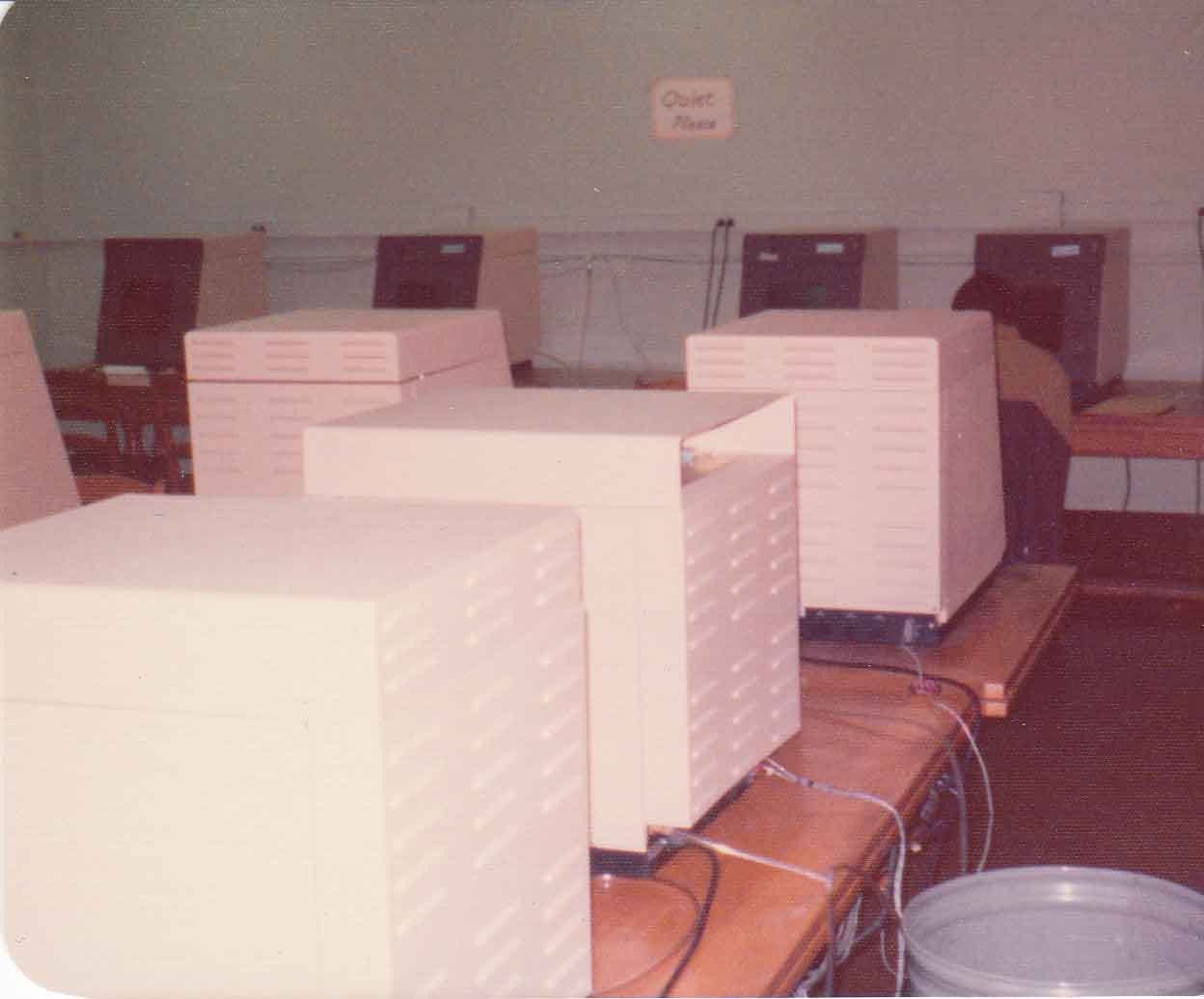The Codex - Entry 0003: Dungeon (1975)
An unfinished, unplayable link in the RPG chain with a fascinating creator

Game: Dungeon
Platform: PLATO
Release Date: 1975
Reader, your eyes are not deceiving you. The first RPG I covered also went by the name Dungeon, and the second was known as Game of Dungeons, and now... We’re back to Dungeon again!
Sadly, like m199h (aka Dungeon), this Dungeon is no longer playable in any form. All we have is the title screen pictured above. It’s quite an impressive title screen too; supposedly the clock in the middle actually functions and accurately tells the current time!
Although I cannot go into as much detail about Dungeon as I’d like to, thankfully there is much more information available about the game’s primary creator, so that’s what this entry will mostly be about. As you can see in the title screen, Dungeon’s design is credited to five people: John Daleske, Gary Fritz, Jon Good, Bill Gammel, and Mark Nakada. But it’s the first of those names who seemingly led the project, and his history with game development on the PLATO mainframe provides a fascinating glimpse into the very beginnings of this medium.
The first thing to know about John Daleske is that it’s a minor miracle that he was able to create games at all. That’s because in 1972, Daleske was nearly sent off to war in Vietnam, like nearly two million other young men of the time. He attended boot camp but somehow narrowly managed to avoid actually getting shipped out. One wonders how many potential budding game devs we lost—on both sides—to the horrors of that unnecessary conflict.
Thankfully, though, Daleske avoided that fate and instead attended college at Iowa State University, where he quickly became obsessed with the school’s hottest new technology: the PLATO terminal. And I mean seriously obsessed. Daleske would regularly hang out in the education building—where the campus’s sole PLATO terminal was located—all night, playing games or programming his own until 6 a.m., when the system would reset and kick him off. At that point, he’d scamper back to his dorm room and catch a few hours of sleep before class before doing it all over again.

Of course, just because Daleske wanted to spend all of his free time with PLATO doesn’t mean he was supposed to. Technically, he wasn’t allowed to be in the education building past a certain time. In order to do those overnight sessions, he would often hide out in the building with the lights switched off so that campus security wouldn’t kick him out. There were even a few occasions where, upon accidentally finding himself locked out, he picked the lock of the education building in order to get back in.
Eventually the school administration took notice of Daleske’s extracurricular activities, and he was called to a meeting with Trevor G. Howe, then the dean of Iowa State University’s College of Education. Daleske probably expected to get screamed at, banned from the building, or perhaps even suspended. To his surprise, though, the dean offered him a letter giving him permission to enter the education building at any time, alongside a key to the building.

Explaining this event to The Friendly Orange Glow author Brian Dear, Daleske said:
“[The dean] said he didn’t want to have to replace the lock because I was wearing it out.”
Incredible stuff. Bless that dean!
In the spring of 1973, with unrestricted access to the PLATO system, Daleske started working on what would be his most popular game: Empire. Initially this was the final project for an education class he was attending at Iowa State University, but it grew into what would be the first ever networked multiplayer space shooter.
Heavily inspired by Star Trek, Empire is another one of those shockingly complex PLATO games. It may look simple, but it has a surprising amount of depth, from a simulated economy, to dynamic player alliances, to real-time in-game messages that could be sent to individual players or teams. Later versions of Empire introduced developer-ruin events and tournaments and even a “monitor mode” where PLATO users could just watch rather than play—quite likely the earliest version of a spectator mode ever put into a game.

Empire became an absolute hit among the PLATO community, and it even has some dedicated players to this day. Cyber1 considers it one of the “Main Attractions” of its emulated PLATO service.
While Daleske continued working on new versions of Empire alongside a small team of other student designers, by late 1974 or early 1975 he started working on a new project. His goal was to take the lessons learned from Empire’s popularity and marry them to the similarly beloved early fantasy RPGs, like dnd and pedit5. In other words, he wanted to create something like those early dungeon crawl RPGs but make it multiplayer.

Though it’s no longer playable, Daleske said a functioning version of Dungeon was released at some point. The game was first-person and had multiple players adventuring through a 3D maze full of monsters and treasures together. It was arguably the first multi-user dungeon (MUD) ever made, and Daleske claimed it was a predecessor to Moria, a still-functioning PLATO MUD that I’ll be covering soon.
While it may have been an impressive feat, Dungeon never gained the same level of popularity as Empire. Daleske suggested this could have been due to the game running too slowly or being too complicated. He also stated on his own website that it was “incomplete”—never properly finished despite being playable.
There’s a good reason for that incompleteness, though. In May 1975, half a year or less into his work on Dungeon, Daleske was diagnosed with terminal cancer. Understandably rattled by the news, the young students focused less of his time and attention on making games. Thankfully, he later discovered that he had been misdiagnosed, but not before he had lost a year to planning for the end of his life. By the time he was mentally recovered from that whole scenario, Daleske had more or less moved on from Dungeon, as had most of the students playing games on the PLATO network.

Daleske didn’t give up on PLATO entirely, though. By 1977, he had moved to Minnesota to work at CDC (Control Data Corporation), the manufacturer behind the mainframe computers that PLATO ran on. While working on PLATO, he would often jump into the early versions of forums, message boards, chat rooms, and so on that were available on the network.
It was while partaking in these virtual social functions that John Daleske met Reina Jones, a PLATO enthusiast living in Ohio. The two quickly fell in love, marking if not the first at least one of the earliest examples of a couple meeting online and ending up married. When that marriage happened in October 1977, mere months after first “meeting” on the mainframe, the wedding party included an array of figures from the wider PLATO user community.

In another sharp reminder of how the history of the gaming medium, RPG and otherwise, is quickly vanishing, John Daleske passed away in 2023 at the age of 70. This one hit me particularly hard, both because Daleske was such an interesting figure in the PLATO scene and because, had I started this project just a few years earlier, I could have at least attempted to interview him.
On the plus side, Daleske himself has left behind a ton of writing on his personal website covering the world of PLATO, both gaming and general information. Among other interesting articles, this includes a deep history of the development of Empire across multiple versions. This site provides absolutely essential insight into early game development, and I strongly suggest reading it thoroughly if you’re at all interested in this topic.
While Dungeon may no longer be available, Daleske’s legacy lives on through his website, through the still playable Empire, and through his wife, his two daughters, and his extended family. His contribution to video games is pretty cool and all, but it’s that last one that’s the most important. May he rest in peace.
Programming note: I just wanted to offer quick apologies for the long delay in this article. That’s one reason that none of Cartoon Ghost’s content is paywalled right now, though paid subscriptions are always appreciated.
Researching this entry took me down a few different rabbit holes, and I wanted to make sure to exhaust all my sources before I wrote everything up. I’ve also been preparing for a new day job on top of that. I’m hoping to have a more consistent posting schedule here soon, though! Thank you for your patience!
Sources for this entry
Barton, Matt. Armchair Arcade. “Fun with PLATO.” July 3, 2007. Archived November 20, 2017. https://web.archive.org/web/20171120234946/http://www.armchairarcade.com/neo/node/1396.
Bolingbroke, Chester. CRPG Addict. “BRIEF: Everything We Know About 1970s Mainframe RPGs We Can No Longer Play.” June 30, 2021. Last accessed May 28, 2024. https://crpgaddict.blogspot.com/2021/06/brief-everything-we-know-about-1970s.html.
Computer History Museum. “John Daleske.” Last accessed May 28, 2024. https://computerhistory.org/profile/john-daleske/.
Daleske, John. Daleske Space - History of Computing - PLATO System - Games - Social Media. “PLATO - Also an Excellent Platform to Design Games.” Last modified September 7, 2016. Last accessed May 28, 2024. https://www.daleske.com/plato/plato-games.php.
Daleske, John. Daleske Space - History of Computing - PLATO System - Games - Social Media. “PLATO Empire - Game Innovations - Timeline.” Last modified December 5, 2017. Last accessed May 28, 2024. https://daleske.com/plato/empire.php.
Dear, Brian. 2017. The Friendly Orange Glow: The Untold Story of the Rise of Cyberculture. New York: Vintage Books.
Mahney, Nathan. CRPG Adventures. “Dungeon (1975).” August 19, 2014. Last accessed May 28, 2024. https://crpgadventures.blogspot.com/2014/08/dungeon-1975.html.
Moby Games. “Dungeon.” January 19, 2018. Last modified August 2, 2023. Last accessed May 28, 2024. https://www.mobygames.com/game/101218/dungeon/.
The RPG Explorer. “Dungeon.” May 1, 2018. Last accessed May 28, 2024. https://exploradorrpg.wordpress.com/juegos/dungeon-plato/.
Stumpff Funeral Home. “John David Daleske.” Last accessed May 28, 2024. https://www.stumpfffuneral.com/obituary/john-daleske.
Video Game History Project. YouTube. “Empire [PLATO] (1973).” January 13, 2019. Last accessed May 28, 2024. https://www.youtube.com/watch?v=Yo8mrNPr_3o.



